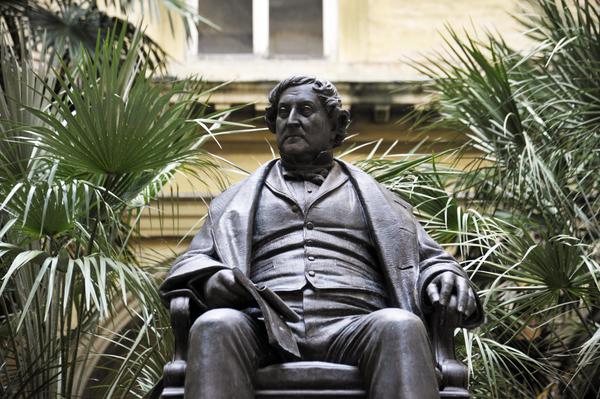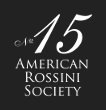Scholars, artists, and appassionisti weigh in on “Why Rossini” (Part 2)

More responses to “Why Rossini?”
If you wish a copy of the ARS newsletter from which these responses were taken, please write to American.Rossini.Society@gmail.com
If you haven’t already, be sure to read Part 1 as well!
Thank you to all who participated!
Why Rossini? Because it fit my voice like a glove, the contralto parts, of course.It also taught me what a Rossini Contralto was, and why originally they were the stars, i.e., Malibran and Pasta. But in the end the one singer I knew was perfect for me was Marietta Alboni.If she sang it, or it was written for her, I knew that it was for me. She was his only voice student, it is written ..Rossini was the true genius of vocal writing and of course, of great compositions. May I add that Stravinsky admired him greatly; he told this to me personally…
– Marilyn Horne
I’ve loved Rossini’s music from a very early age, and to be honest it’s really hard to describe why! There is something in this music which just grips me and doesn’t let go. It has always felt so familiar, so close to myself, so logical, immediate and compelling. The way he manages to transform the simplest musical idea into a vortex of incredible energy is something that is hard to describe, but its effect is palpable to me in every moment of any of his scores. It speaks to me on an almost subconscious level and never ceases to move, influence and inspire me.
– Jakob Lehmann, conductor, violinist, associate artistic director, Teatro Nuovo
Why not Rossini? So many people overlook Rossini as merely a composer of comic operas, but he was so much more than that! His dramatic operas were brilliant, forward-thinking works. His influence on the works of Donizetti and Verdi is undeniable. The “wink and nudge” in his comic works is irresistible. More Rossini, please!
– Sean Kelly, head of music, Opera Omaha
The music of Rossini is full of joy and light, clarity and formal grace. In his comic operas, where his rhythmic brilliance shines through and he uses his signature Rossini Crescendo to its maximum effect, there is an almost surreal frenetic energy produced onstage that sweeps us all up and carries (or perhaps I should say hurls us!) to the end of the act. Yet he is still capable of being poignantly beautiful and elegant in the more serious moments. The operas of Rossini, especially the Opera Serie are incredibly challenging for all the performers, and to be successful they require a bravura style of singing. This forces one to work hard to overcome the technical difficulties that the score presents in order to reach seemingly impossible vocal feats. I personally find that performing the operas of Rossini on a regular basis is a guaranteed and very rewarding way of keeping my technique in its best form.
– Jessica Pratt, singer
So Why Rossini? The only obvious answer for me would be why not? I was struck by his magic when I was 21 in 1987 when I landed a job as an extra in the now legendary production of Ermione at the ROF. Caballé/Horne/Merritt and Blake all reunited to bring back this amazing score to life after 168 years. At the time I hadn’t yet acquired the technical and cultural tools to decipher this masterpiece so I was guided solely by my instinct. But nonetheless I knew that this sublime composer was going to be at the centre of my life. Rossini is joy, Rossini is rhythm, Rossini is intelligence, Rossini is lust, Rossini is delicacy, Rossini is rapture, Rossini is fury, Rossini is rage. Rossini simply embodies all the human sentiments, he’s what I call an organized disharmony, a predetermined craziness, a sublime madness. So really Why not fall in love with Rossini?
– Adamo Lorenzetti, Public Relations, Rossini Opera Festival
Tra tutte le nostre persone, alcune sembra proprio che ci siano venute incontro, a cercarci. Un bel giorno è arrivato Rossini e con lui e attraverso lui tanti Rossiniani che dovevo conoscere, è ovvio, talmente ovvio che non potrebbe essere che così. Io so – e loro sanno – che tra noi c’è un legame speciale, c’è una bella risonanza, c’è di più… . Grazie Gioachino, grazie infinite.
Many people come forward but the special ones seem to have come searching for us. One day Rossini came along and through him many Rossianians that I was bound to meet, it was inevitable. We all know that among us there’s a certain special resonance, a special bond and much more. Thank you Gioachino, thank you so much.
– Carla Di Carlo, Publication and Archives, Rossini Opera Festival
Why Rossini? Because… “Son donna, e tutto ho detto!” (Matilde di Shabran, Act I, 7). Pochi musicisti hanno saputo valorizzare così i personaggi femminili, creare un mondo di regine, guerriere, eroine, madri, figlie, spose, maghe, seduttrici, combattive e dolci, tenere e fiere. Rossini ha fatto cantare le sue eroine, le ha avvolte di una musica dalle infinite sfaccettature, senza mai fermarsi allo stereotipo Grazie, Gioachino, per aver cantato così l’universo femminile, con la tua musica che conquista al primo ascolto, ma stupisce ogni incontro successivo, andando sempre più in profondità. Il colpo di fulmine conduce in un mondo da esplorare in cui tragedia e commedia continuano a specchiarsi, in cui il fascino travolgente della musica racchiude infiniti piani di lettura, mille sfaccettature psicologiche. “Più se ne cava, più ne resta a cavar”.
“I am a woman, and I have said everything!” (Matilde di Shabran, Act I, 7.) Few musicians have been able to enhance female characters in this way, create a world of queens, warriors, heroines, mothers, daughters, brides, sorceresses, seducers, combative and sweet, tender and fair. Rossini made his heroines sing, wrapped them in music with infinite facets, without ever relying on stereotype. Thank you, Gioachino, for having sung the female universe in this way, with your music that conquers at first listen, but amazes at every subsequent encounter, going deeper and deeper. The love at first sight leads to a world to be explored in which tragedy and comedy continue to be mirrored, in which the overwhelming charm of the music contains a thousand psychological facets. “The more we draw from such a source, the more remains to be drawn.”
– Roberta Pedrotti, critic, author
Why Rossini? Because our life is better with him! For sure! Can you just think of a world without his music? NO! It’s impossible! Because the best possible world is a “Rossinizzato” world! Rossini’s music and his incredible personality give me a daily injection of joy, of beauty, also something deep to think about, especially playing his Péchés de vieillesse. Sometimes I have a weird thought: “If Rossini were to be the President of the United States…also the Italian Prime Minister…also…also…”. Thank you Gioachino, Happy Birthday!
-Alessandro Marangoni, pianist
Perché Rossini? Perché la sua musica se ben eseguita ha un linguaggio universale che può essere compreso in tutto il mondo. È uno stile che conquista proprio per la sua matrice astratta ma che può assumere altissimi gradi interpretativi a seconda di chi la esegue. Da ragazzo seguivo in tv e registravo su vhs le straordinarie esecuzioni del Rof con I piu grandi interpreti Ramey, la Valentini Terrani, Rockwell Blake. Fu subito amore Cantare al ROF è una grande responsabilità, perché dobbiamo portare avanti una tradizione culturale che ci rende particolarmente fieri. Rossini ha creato una musica senza tempo pur essendo il “ritmo” la sua caratteristica fondamentale e che non passerà di moda.
Why Rossini? Because his music, if well performed, has a universal language that can be understood all over the world. It is a style which conquers precisely because of its abstract nature but can can assume the highest degree of interpretation depending on who performs it.
As a boy I followed on TV and recorded on VHS the extraordinary performances of ROF with the greatest interpreters
Ramey, Valentini Terrani, Rockwell Blake. It was instant love.
Singing at the ROF is a great responsibility, because we must carry on a cultural tradition that makes us particularly proud.
Rossini has created a timeless music, the “rhythm” its fundamental characteristic and will not go out of fashion.
– Carlo Lepore, singer
“Why Rossini?” Above singling out from plentiful superlatives one could list about the music, the man himself, or the many performers (and colleagues) who have brought the art to life, I would propose the answer: Rossini “sparks joy!” “Sparks joy” in the Marie Kondo, hold it close to your heart-“takimeku” sense (the word also translates to “palpitate” or the often used libretto word “palpitare”)! So behind the beautiful music, the many hours of hard work that go into performing and presenting that music, and the numerous connections, colleagues, and friends made along the way, the answer when I am asked “Why Rossini?” is that every aspect of Rossini that nears my heart “sparks joy!”
– Randall Bills, singer
Why Rossini? What other reason could there be, but….pure genius combined with joy, beauty, excitement, amazement, gracefulness, elegance, comedy, drama….music?
The obvious inheritor of the heavy mantle of Mozart, whose musical insight, and foresight, pointed the way for Verdi and all who followed…if only with the monumental creation of his Guillaume Tell, not to mention his many other ‘no-less-significant’ creations!
But on a more personal note, Rossini gave THIS singer the wings with which to soar high and give his musical and personal life meaning and dedication.
– Chris Merritt, singer
Finally, “About Rossini” from interviews on this site,
Every other opera Rossini wrote( aside from Il Barbiere) needs a lot more musical and vocal fuel to keep the audience satisfied. My old adage was : If a Rossini Opera faisl to please, it was performed badly. My new adage is: If you are going to perform a Rossini Opera badly, please choose Il Barbiere. It will survive.
– Rockwell Blake, singer
Rossini is very difficult, because it needs great technique, lightness of touch and beautiful sound all the time. To balance everything is a difficult task, but when it all comes together it is very satisfying.
– Speranza Scappucci, conductor
The overture to La pietra del paragone has what we think is the first notated glissando in a clarinet part! (Another glissando clarinet moment you might be familiar with is the clarinet solo in the opening to Rhapsody in Blue, which is very jazzy and something quite different – but it’s the same sliding effect.) It’s fantastic: the clarinet stops on a high note, and then slides down an octave to play the theme!
-Marie Ross, clarinetist
If you haven’t yet, check out Part 1!
